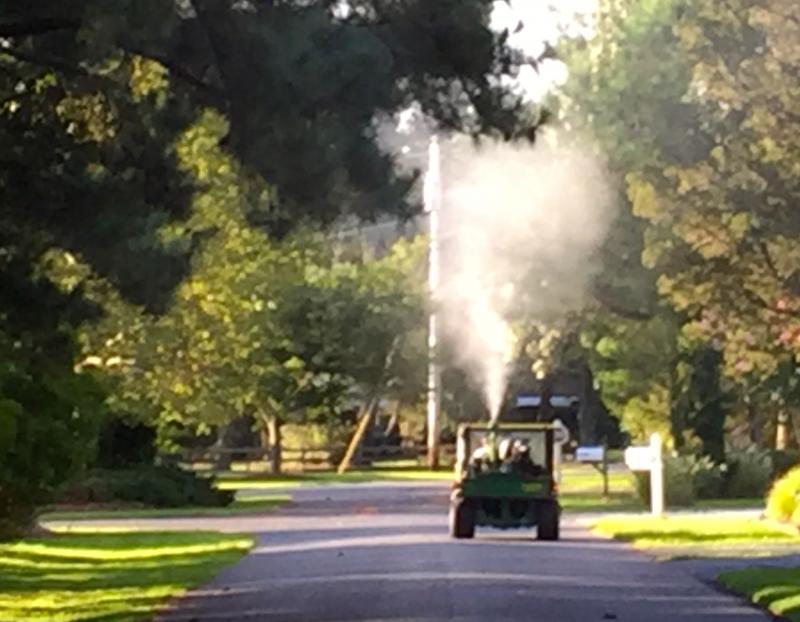Mosquitoes, used tires and T.S. Eliot’s prediction
I enjoyed speaking last week with Dr. Bill Meredith, who heads up Delaware’s mosquito control division. Bill is one of those guys who is very knowledgeable in his field, enjoys his work, does it well and loves to talk about it. Interviewing him amounts to asking one decent question. Like opening a spigot and letting it run. All you need to do is grab a tablet and a few pens and then use them as your bucket to catch the information.
Now that Hermine has brought some rain, Bill and his crew - as predicted - will probably have their hands full dealing with mosquito blooms.
Lulu and I rode to Rehoboth Beach last Friday morning on the Gordons Pond trail. On a side trip through North Shores, we followed - at a respectable distance - a man aboard a green four-wheeler fogging along the streets.
“Spraying for mosquitos, I’m guessing,” I said. “Makes sense.”
I cut off on a side street to catch up to him and take a photograph. My mouth was running pretty strong, what with all the oxygen from pumping the pedals. I gave up caffeine a while back. Headaches disappeared. The gabbiness did not. Nonetheless Lulu found a way to wedge in a comment.
“I read something this week that someone spraying mosquitoes in North Carolina killed a whole bunch of bees. It’s a shame there has to be side effects like that.”
Bees, mosquitoes. That’s a tough one. How do we keep it all in balance? I mentioned to Lulu Bill’s comment about his mosquito colleagues in the Division of Fish and Wildlife. “We’re biologists first, bug killers second. We’re very aware of not wanting to do something wrong. But our mission is to control mosquitos.”
When we peeled off from the fogger, he had turned into Henlopen Acres and started on the streets in there. I’m guessing he’s contracted by Henlopen Acres and North Shores to help with the bugs. The two communities cooperate on security patrols. Maybe they do the same with fogging.
Bill said his crews used to think a lot about fireworks shows and outside concerts as needing attention in the summer. “But the big one now is the Firefly Festival at Dover in June. The venue is on top of wet woodlands and not far away is a saltwater marsh. That’s a double whammy for mosquito production. Put that together with screaming young people - bare-chested men and halter-topped women - sweating in the hot evening air. Mosquitos are attracted to sweat and carbon dioxide. That’s definitely an event that we have to stay on top of.”
He also talked more about the Asian Tiger Mosquitos - an invasive species that has become one of our worst mosquito pests. They are being watched closely because of their potential to carry Zika virus between mammals, including humans. None of that transmission has been seen yet in Delaware, but he said the potential exists.
What’s interesting though is how the Asian Tiger Mosquitos made it into the U.S. Bill said they came in on a shipload of used tires offloaded in Houston, Texas, from Japan. Anyone who messes around with tires in the least way knows they have a knack for holding water inside them. Mosquitos - especially Asian Tiger Mosquitos - breed in captured water like that. Even a bottle cap in your yard with water in it from rain can breed mosquitoes. “People should make sure they empty out any containers with standing water in their yards. Abandoned swimming pools and sloppy neighbors can cause real infestations. But one of the first questions that comes to mind,” he said, “is why are we importing used tires from Japan? Don’t we have enough used tires here? The explanation I’ve heard is that the Japanese have a higher standard for when they should change their tires. So they ship tires to us that still have plenty of life left in them and lend themselves to resale and recapping.”
After the mosquitoes arrived in 1985 and started to spread, a Milford used tire dealer went to a tire dump in North Carolina and picked up a load for resale and retreading. “A fish and wildlife official in that state wrote down the tag number of the man - who, by the way was doing nothing wrong - and informed us,” said Meredith. “We checked on his location a while later and lo and behold, we found Asian Tiger Mosquitos in and around the tires. By 1987 they had a solid foothold in Delaware, and we’ve been dealing with them ever since.”
So that’s the way it all happens. What was it that T.S. Eliot wrote? “This is how the world will end, not with a bang, but a whimper.” Or maybe the last sound will be the high-pitched hum of virus-infected mosquitos.
















































